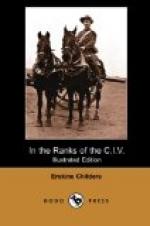We rumbled slowly on all the morning, past the same sort of country, with dead horses and broken bridges marking Roberts’s track, and at Brandfort stopped to feed horses, which, by the way, is a nasty dangerous game when you are dealing with closed horse-boxes. You have to climb through a small window, get in among the horses, and put the feeds on as they are handed up. The horses are not tied up, and are wild with hunger. You have simply to fight to avoid being crushed or kicked in that reeking interior, for they are packed as thick as possible.
At Vet River we got the first news of fighting. Boers under De Wet had been breaking bridges, and cutting wires. A very seedy-looking Guardsman gave us the news, and said they were cold and starving; and they looked it. What regiment was there? “Oh, we’re all details ’ere,” he said, with a gloomy shrug. At Zand River infantry were in trenches expecting attack. A fine bridge had been blown up, and we crossed the river, which runs in a deep ravine, by a temporary bridge built low down, the track to it most ingeniously engineered in a spiral way. An engineer told us they had had hard fighting there a day or two ago. We reached Kroonstadt about dark; but remained outside all night, supperless and freezing.
June 22.—I walked about most of the night, and got an engine driver to squirt some hot water into a mess-tin to make tea with out of tablets. In early morning a train disgorged a crowd of men who had been prisoners with the Boers at Pretoria, some ever since the first battle. When Roberts came they all escaped, under shell-fire from the Boers as a final conge. They were a most motley crew, dressed in all manner of odd clothes. At 7 P.M. coffee and porridge, and at 7.30 orders came to detrain and harness up sharp, the sections to separate again. Then followed a whole series of contrary orders, but we ultimately harnessed up and hooked in; the right section marched away, and soon after we of the left section did so too, about two o’clock. About three miles off, after climbing a long hill, we unlimbered the guns in a commanding position, and remained there till dark, in the close and fragrant neighbourhood of about twenty dead horses. I believe we had something to do with some possible or probable fight, but what, I don’t know. A very dull battle. We marched back at dark, and bivouacked near the town, close to some Lancers. Of course tents are said good-bye to now. I slept by my harness, very cold.




